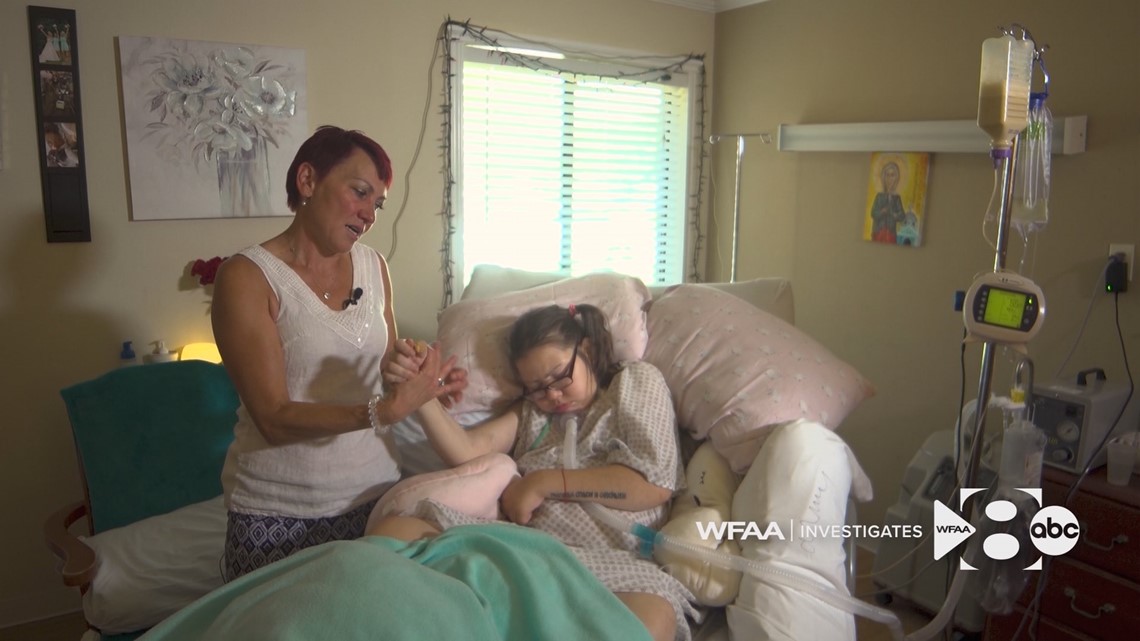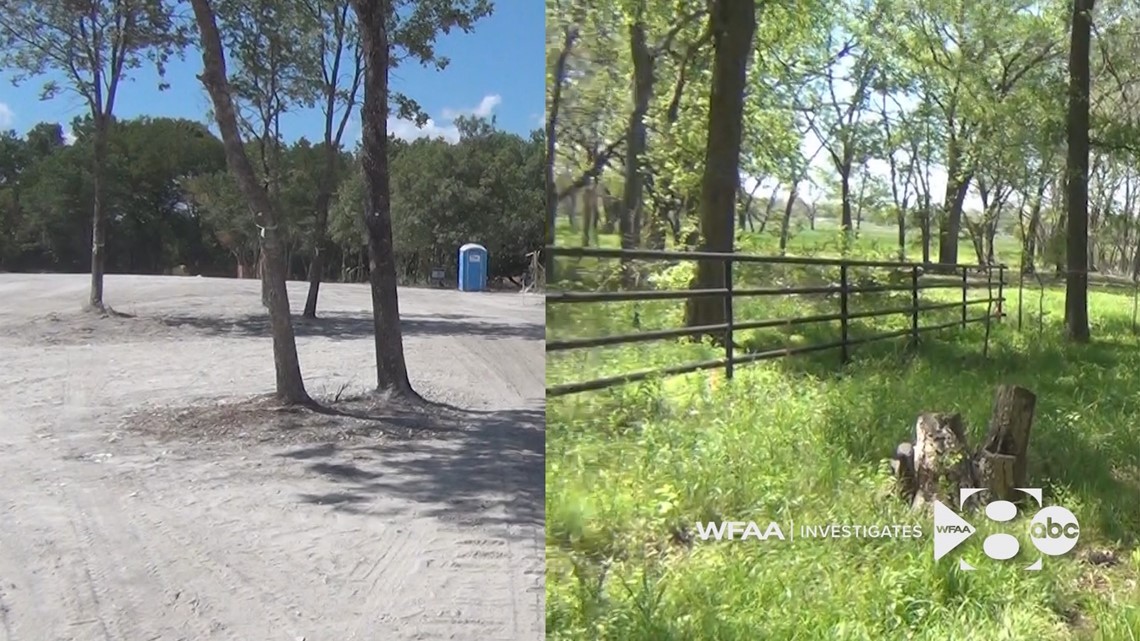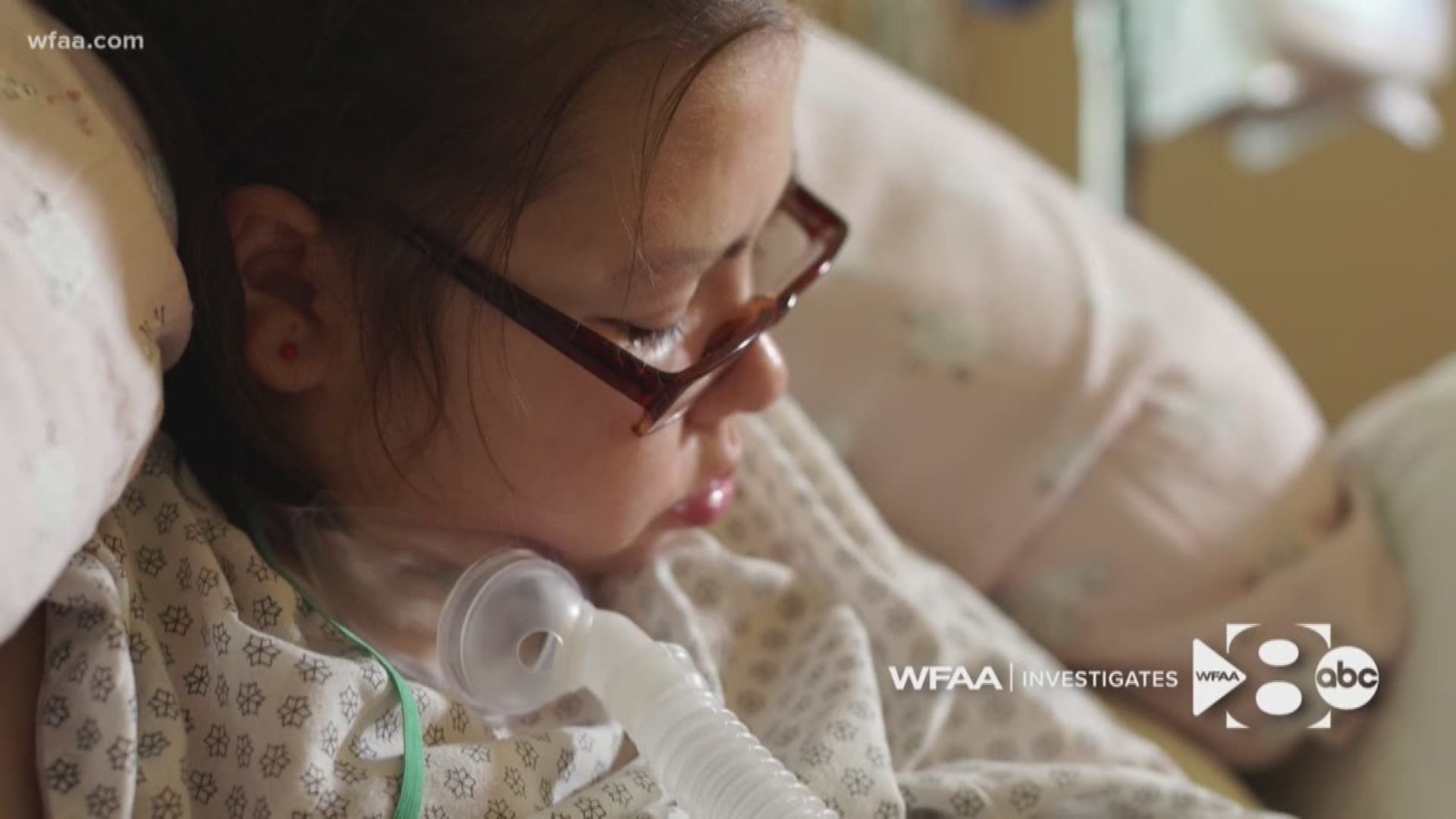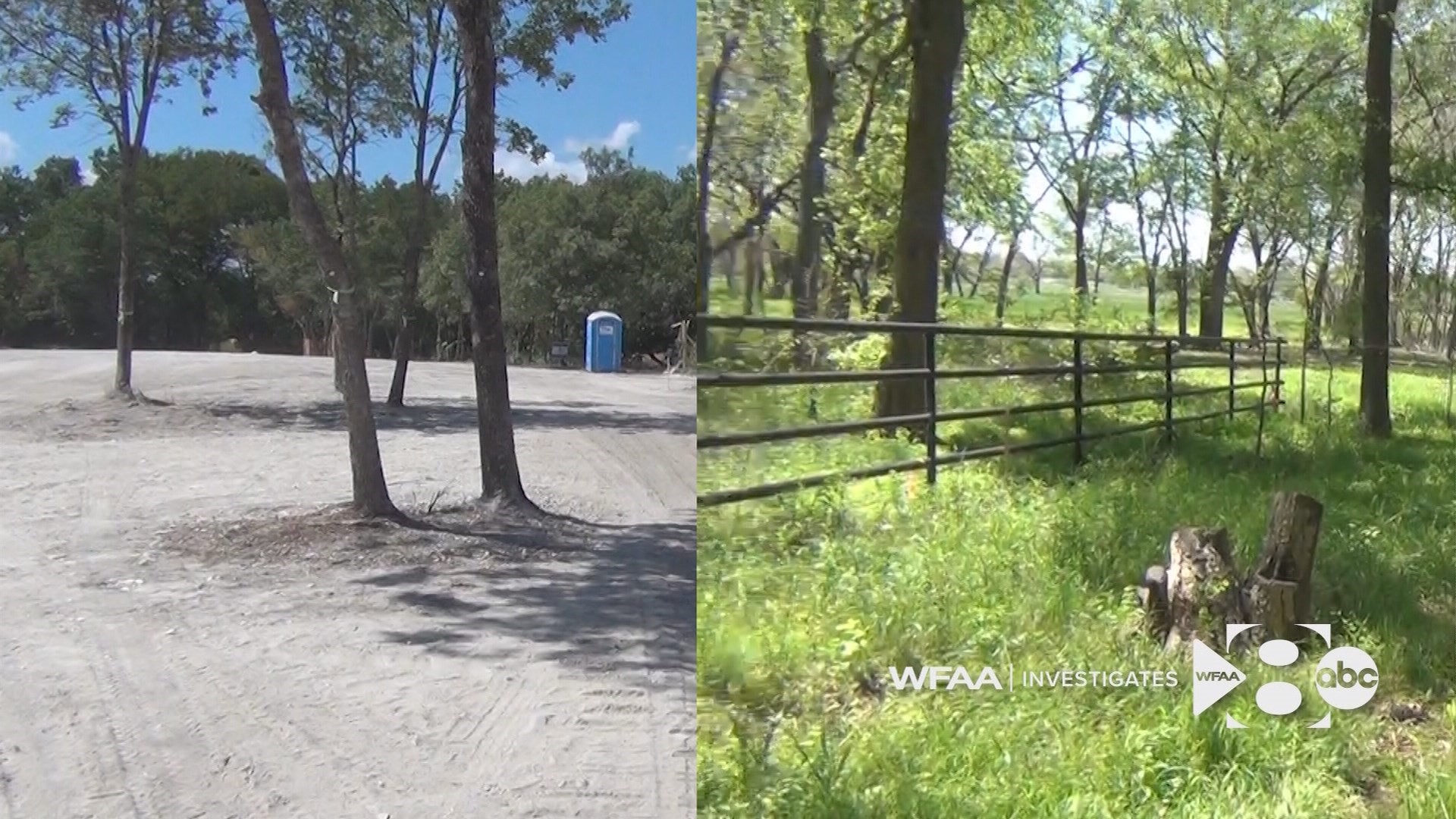DALLAS — This story has been updated with additional comments from The North Texas Municipal Water District
Ksenya Samsonova was a Booker T. Washington High School graduate with a full ride to a fine arts college.
But today, she colors with the help of her mom.
She breathes with the help of a machine.
Samsonova is only 27 years old. Yet she spends all day, every day, in a nursing home bed surrounded by her old paintings, a sign of the potential she once had.
In 2015, Samsonova went to Parkland Memorial Hospital in Dallas for surgery on her leg to repair an injury. The surgery went as expected, and Samsonova was spending a few days in the hospital recuperating.


That’s when, medical records show, she suddenly stopped breathing for about nine minutes. Staff found her unresponsive and in cardiac arrest.
What happened?
Medical records said nurses may have given Samsonova too much pain medicine causing a “suspected narcotic overdose.”
“They just said, 'We are so sorry, so sorry this happened,'” recalled Samsonova’s mother, Helen Verucchi.
Parkland waived Samsonova’s million-dollar medical stay but Verucchi told WFAA that her daughter requires long-term financial help. After all, Samsonova now requires round-the-clock nursing home care.
But taking Parkland to court was a dead-end road.
“I've been told, 'You're going to waste your time with (Parkland) because (they) are a government hospital,'” Verucchi said. “'You will get nothing. You just have to walk away.'”
That’s because Parkland is a county hospital and protected under an old legal concept called "sovereign immunity." The law’s purpose was to keep taxpayer-funded entities like public hospitals, schools and even the government itself from being bankrupted by lawsuits.
Sovereign immunity
WFAA has found a growing number of Texans stymied by governmental entities claiming sovereign immunity.
Maria Wormington says she's been troubled by immunities granted to governmental entities like public hospitals.
Wormington is a McKinney-based medical malpractice attorney. She told WFAA that each week she is approached by families with possible medical malpractice claims against public hospitals like Parkland. But she tells them she can’t take their case because of the restrictions of sovereign immunity.
“It has become increasingly difficult to successfully prosecute any type of a civil case against a county or a state hospital,” Wormington said. “Every time the legislature meets, it seems that the screws get tightened a little bit more.”


If Helen Verucchi took a public hospital like Parkland to court, the maximum award she could get would be $100,000, which likely wouldn't come close to the fees she'd pay for an attorney and expert witnesses.
Also, unlike the two-year statute of limitations for many cases, claims against public hospitals must be filed within six months.
“This is impossible to do in situations where, for example, you don’t know what they did wrong,” Wormington said. “Or in more egregious situations where you don’t find out they did anything wrong until years later. For example – a retained sponge after surgery. If you don’t find out about it until a few years down the road – too bad.”
Other hurdles limit the kind and scope of possible malpractice cases that may be filed, and difficulties surrounding the testimony of needed experts.
Wormington told WFAA she believed the immunity protections are designed specifically to prevent Texans from filing suit.
“If I can't help them, if attorneys like me can't help them, then there's nowhere for them to go in the civil justice system at all,” Wormington said.
Verucchi told WFAA her daughter was a happy and healthy young woman prior to being admitted to Parkland for leg surgery. But now, she requires 24-hour care and told WFAA there’s no way to hold Parkland financially accountable.
Parkland declined WFAA's requests for an on-camera interview. Despite our numerous attempts, Parkland spokeswoman April Foran referred questions about sovereign immunity to the Texas attorney general. She also would not answer any questions about Samsonova’s case.
Foran told WFAA that its questions about Samsonova “implies legal action is being contemplated in some form or fashion and, again, it would be disingenuous for WFAA to suggest otherwise.”
WFAA informed Foran that Samsonova’s family is not filing a lawsuit. After all, the statute of limitations has run out. Nevertheless, Foran still cited pending legal action as Parkland’s reason for declining WFAA’s interview requests.
Other former public hospital patients told WFAA that such responses are an attempt to avoid discussing governmental immunity.
“People don't seem to know the monster that they've created within the state of Texas … (Public hospitals) know they've got this get out of jail free card and they know they can do anything to anybody and there are no consequences. None,” said Kathryn Weber.
Weber told WFAA a different public hospital botched her breast reduction surgery and she, like Verucchi, has no recourse.
In recent years, the power of sovereign immunity has continued to expand in Texas and with it, a study from Health Services Research shows the number of medical malpractice suits have plummeted against the state’s largest public health care system.
The University of Texas system has more than 6,000 employed physicians and 3,500 medical students in six health campuses, records show. Yet the relative number of claims have been minuscule and getting smaller.
In fiscal 2002, there were 244 claims closed with 60 settlements. By fiscal 2015, there were 73 claims with 16 settlements.
“In a large, self‐insured public academic health system in Texas, malpractice claims and payments decreased sharply following legal changes that reduced rights to sue and available damages,” the study reported.
It’s not a surprise to attorneys like Wormington.
“If there's no mechanism for accountability, then what is the motivation for improvement? Not much,” Wormington said.
Landowners
The power of sovereign immunity has also affected North Texas landowners, like Justin Jinright, who built his family's dream home on about 15 acres in Collin County.
Jinright signed a contract with the municipal water district to allow it to build a pipeline. Water district officials said they would “restore the ground" to "the same condition" as it was "prior to the construction."
Jinright, however, said that did not occur. And after taking them to court, the district claimed governmental immunity.
“The contract is not worth the paper it's written on,” Jinright told WFAA.
He built his family's dream home on about 15 acres in Collin County, where there's plenty of nature, wooded forests and room for livestock.
But today, his property looks quite different from when he purchased it five years ago.
“It looks like a dump. This is not the property we purchased,” Jinright said.


What happened?
A few years ago, Jinright signed a contract with the North Texas Municipal Water District (NTMWD) allowing a public water pipeline to be buried on his property.
The project is called the North McKinney Pipeline. A quarter of a mile of the pipeline runs across his property.
Before pipeline construction began, Jinright and NTMWD signed a contract. The contract says the NTMWD will “restore the ground" to "the same condition" as it was "prior to the construction."
But that’s not what happened, Jinright told WFAA.
“(The North Texas Municipal Water District) put the pipeline in the ground, covered it up, and ran out the door. And (they) haven't done anything since,” Jinright says.
He filed a complaint with the Texas Commission on Environmental Quality. State regulators investigated and determined the NTMWD was in "non-compliance" of state standards.
Despite the state’s ruling, Jinright still has little recourse.
The NTMWD has claimed that it is protected under sovereign immunity.
As for that contract that Jinright and NTMWD signed?
“At the end of the day, the organization you are entering into this agreement with, in my case the North Texas Municipal Water District, they can breach it and there is zero recourse for you,” Jinright said.
Effectively what you have is a one-sided agreement,” Jinright added. “…where the water district has all the authority to enforce and there are zero rights and remedies for the landowner.”
The NTMWD declined to talk to us on camera about their claims of sovereign immunity in Jinright’s case.
Instead, Janet Rummel, a spokeswoman sent WFAA a statement. It says, in part, “Sovereign immunity protects … taxpayers from the cost of lawsuits and judgments … The limits of sovereign immunity are set by our elected lawmakers in Austin."
“Regardless, sovereign immunity laws have not prevented the landowners’ from seeking resolution in court,” Rummel added. “Because the matter is subject to ongoing litigation, it would be inappropriate to make any further statements at this time.”
In another email, the NTMWD told WFAA that Jinright denied their contractor access to his property. And since then, the NTMWD has “repeatedly requested permission to access the Jinright property for our contractor to complete the soil restoration work and has repeatedly been denied access.”
Jinright told WFAA that he had blocked the contractor and NTMWD from accessing his property during his legal dispute because they had neither forewarned him nor provided specific detailed plans for the restoration of his property.
“If they are going to come out here and do work, they need to schedule it because I need to know the extent of the work they plan,” Jinright told WFAA. “They need to put the specifics in writing, especially while under the subject of a legal dispute. Excuse me if I don’t take their word.”
Rummel also told WFAA that by 2018, “the easement area had almost completely re-vegetated naturally, and the soil was stabilized. Yet for reasons unknown to NTWMD, actions were taken to destroy the very groundcover about which the landowner had been complaining was insufficient.”
However, the TCEQ and environmental groups like Stormcon indicated that any growth of vegetation referred to the NTMWD was not a natural re-vegetation of the original land, but rather appeared to be weeds that grew on the caliche soil growing on backfill from the installed pipe in 2014 and 2015.
Jinright said he had begun in 2018 to fill the area with topsoil to allow for sustainable vegetation other than weeds.
He said he has spent more than $300,000 on legal fees appealing the NTMWD’s claims of immunity. The Texas Supreme Court recently denied his appeal without reason.
He’s speaking out to various North Texas city councils because he wants other Texas landowners to beware, that they could be blocked from any legal relief.
“We’re an unfortunate story. but the bigger picture here is this can't just happen to us,” Jinright told WFAA. “This can happen to anybody.”
More on WFAA:
- ‘Put up or shut up’ | How much progress has Fort Worth made on task force’s recommendations to bridge city’s racial divide?
- Police make arrest in stabbing death of Ponder mother
- Southwest pushes back return of troubled Boeing Max, again
- 'It's bad': Three dead, others injured in fiery multi-vehicle crash on I-35W in Denton
- Texas judges may have overstepped by clearing violent criminal records


